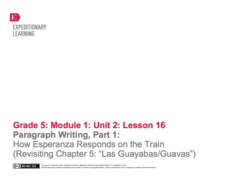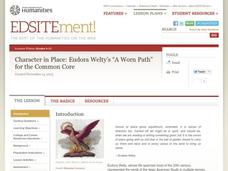EngageNY
Paragraph Writing, Part 1: How Esperanza Responds on the Train (Revisiting Chapter 5: "Las Guayabas/Guavas")
When your class members have completed the novel Esperanza Rising, they will be ready to write an expository essay on how Esperanza responds to events and what this says about her character. Set your pupils up for success by...
National Endowment for the Humanities
Character in Place: Eudora Welty’s “A Worn Path” for the Common Core
How do writers use the interaction between elements like characterization and setting to create meaning? Readers of "A Worn Path" create a series of comic book-style graphics of Eudora Welty's short story and reflect on how Welty...
Curated OER
What a Character! Comparing Literary Adaptations
What do Robert Downey Jr., Basil Rathbone, Jeremy Brett, Fritz Weaver, Roger Moore, Benedict Cumberbatch, and Daffy Duck have in common? Why, it’s elementary, my dear Watson! They all have portrayed Sherlock Holmes. Literary detectives...
Curated OER
CAN WE SWITCH GENDERS OF STORY CHARACTERS?
Analyze characters and stories to identify stereotyping. Learners will examine the concept of character gender to evaluate bias in classroom story books. They are asked to read a story or play and change the gender of the character to...
Curated OER
Tell Me; I’ll Listen
Encourage respect, responsibility, and caring within your classroom with a collection of lessons that spark dialogue and self reflection. To address character traits, lessons touch on topics such as staying safe in the...
Curated OER
Simple Machines IV - Levers
The principles of levers and simple machines are presented here. An easy-to-make lever is constructed by each group of scientists, and they use it to explore how this simple machine makes heavy things so much easier to lift and move. A...
Curated OER
Mythological Word Origins
Review myths and the characters therein, connecting them to vocabulary words in the English language today. Begin by searching online for myths and character names. With at least ten names that are familiar English words, young scholars...
New York City Department of Education
Geography and Early Peoples of the Western Hemisphere
Young historians discover the early people of the western hemisphere. The unit explores how the land changed, how it was used and homes of early Americans such as Incas, Mayans, Inuits, Aztecs, and Pueblos. Individuals also examine these...
University of California
Plankton
Plankton: so much more than just a SpongeBob character. Three different activities have kids looking at both phytoplankton and zooplankton in pictures, as well as collecting their own samples (depending on your access to a saltwater...
Curated OER
Full Esteem Ahead
Young learners who feel good about themselves will fare better in the long run than those who do not have a high level of self-esteem. Introduce youngsters to what it means to like themselves. Discuss positive characteristics and...
Curated OER
Blogging to Create a Community of Writers
One of the keys for successful teaching is connecting curriculum to real-life experiences. This lesson on blogging does this, by making writing, revising, and publishing a reality. Pupils create a character for a story, write about their...
Curated OER
The Call of the Wild: Differences Between a Book and a Movie Adaptation
Fling your class members “into the heart of things primordial” with a Venn diagram activity that highlights how the same themes are treated in the film and book versions of The Call of the Wild. Consider extending the exercise by having...
Curated OER
Rewriting Shakespeare
Have your learners play around with Shakespeare's language. In this plan, small groups examine and rearrange soliloquies from Othello, noting how the language changes and morphs. All groups have a chance to change each soliloquy, making...
Curated OER
Ending a Famous Fairy Tale
Altering the ending of a famous fairy tale is a really fun way for kids to experience creative writing. The lesson here has them do just that! Learners listen to the famous fairy tale, "The Twelve Brothers," and change the ending of the...
Curated OER
Setting's Effect on a Character's Actions
Do the actions of a character in a story change based on the setting the writer provides? Learners explore the concept of character action in relation to story setting by investigating the setting and events in the story Science...
Curated OER
Mo Willems Author Study
Who is Mo Willems? Explore the author with your class. Learners read books written by Willems, compare and contrast the characters therein, and make predictions about what will happen. Finish off this author study by having small groups...
Gwinnett County Public Schools
Analysis of the Tuck Everlasting and The Birchbark House Text Exemplars
Looking to introduce some text-based questions into your ELA lessons? Practice the kinds of skills the Common Core demands with the seven text-based questions and the essay prompt provided here. Designed to be a three-day lesson, day one...
Film Space
Whale Rider
Ready for an educational movie day? Use a resource based on the movie Whale Rider to learn more about the Maori culture. Class members answer a variety of questions and listen to music from the soundtrack to further analyze and...
Curated OER
Voice and James Joyce
After reading a text written by James Joyce, middle and high schoolers find examples of passive voice. They share their findings with the class. Use this lesson to emphasize the effect of passive voice in writing.


















